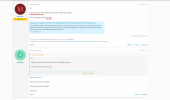Username:
TITLE
CPU loads at 100% / Mail Log Browser Extension
PRODUCT, VERSION, OPERATING SYSTEM, ARCHITECTURE
20.04.4 LTS
18.0.45 Update #2
PROBLEM DESCRIPTION
Hello,
CPU gets up to 100% when the extension (Mail Log Browser) is loading the data.
I tried to reproduce this 3 times, and I confirm in my side, that I notice unusual CPU SPIKE.
STEPS TO REPRODUCE
Just try to access to the Log Browser, and normally the data will not loading.
After, try to check the CPU.
ACTUAL RESULT
CPU gets up to 100%
EXPECTED RESULT
CPU should not be load at 100% to get the log.
ANY ADDITIONAL INFORMATION
(DID NOT ANSWER QUESTION)
YOUR EXPECTATIONS FROM PLESK SERVICE TEAM
Help with sorting out
TITLE
CPU loads at 100% / Mail Log Browser Extension
PRODUCT, VERSION, OPERATING SYSTEM, ARCHITECTURE
20.04.4 LTS
18.0.45 Update #2
PROBLEM DESCRIPTION
Hello,
CPU gets up to 100% when the extension (Mail Log Browser) is loading the data.
I tried to reproduce this 3 times, and I confirm in my side, that I notice unusual CPU SPIKE.
STEPS TO REPRODUCE
Just try to access to the Log Browser, and normally the data will not loading.
After, try to check the CPU.
ACTUAL RESULT
CPU gets up to 100%
EXPECTED RESULT
CPU should not be load at 100% to get the log.
ANY ADDITIONAL INFORMATION
(DID NOT ANSWER QUESTION)
YOUR EXPECTATIONS FROM PLESK SERVICE TEAM
Help with sorting out




